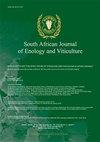南非白诗南老葡萄的概念研究
IF 1.1
4区 农林科学
Q4 FOOD SCIENCE & TECHNOLOGY
引用次数: 4
摘要
尽管按照欧洲的标准,南非的葡萄园还很年轻,但业内有一种信念,即35年或以上的葡萄藤生产的葡萄和葡萄酒具有特定的特征(“老藤葡萄酒”)。本研究的目的是利用典型性评级和分类任务来调查陈年白诗南葡萄酒概念的存在。白诗南葡萄酒是用5 - 45年树龄的葡萄酿制而成。酿酒是标准化的,不使用木材。对年轻葡萄酒(第一阶段)和两年瓶装葡萄酒(第二阶段)进行了典型评级和分类任务。主成分分析(PCA)对评级数据进行了分析,得出了判断一致的结论,但葡萄树龄与典型性评级之间没有相关性。排序结果提交给对对应分析(CA)和多维缩放(MDS)结果进行分组和属性排序的聚合层次聚类(AHC)。年轻的葡萄酒和两年的瓶装葡萄酒的集群是不同的。评委会对陈年白诗南葡萄酒的评价是“复杂”、“平衡”、“丰富”和“口感好”,这体现了评委会对陈年白诗南葡萄酒概念的认同。然而,由于评委们并没有根据葡萄年份对葡萄酒进行分类,因此概念的感性方面无法得到确认,其特征也无法得到进一步的检验,感官空间也无法构建。本文章由计算机程序翻译,如有差异,请以英文原文为准。
Investigating the Concept of South African Old Vine Chenin Blanc
Although South African vineyards are still young by European standards, there is a belief in the industry that vines aged 35 or more years produce grapes and wines with specific characteristics (“old vine wines”). The aim of this study was to investigate the existence of the concept of old vine Chenin blanc wines using a typicality rating and sorting tasks. Chenin blanc wines were made from grapes harvested from vines aged five to 45 years old. Winemaking was standardised, with no wood contact. Typicality rating and sorting tasks were performed on young (first-stage) and two-year bottle-aged (second-stage) wines. Principal component analysis (PCA) on rating data demonstrated judge consensus, but no correlation was found between vine age and typicality rating. Sorting results were submitted to agglomerative hierarchical clustering (AHC) performed on the correspondence analysis (CA) and multidimensional scaling (MDS) results for grouping and attributes resulting from the sorting task. The clusters were different for the young wines and two-year bottle-aged wines. The verbal aspect of the sorting demonstrated the judges’ agreement on the concept of old vine Chenin blanc, shown by the annotation of the old vine group as ‘complex’, ‘balance’, ‘rich’ and ‘good mouthfeel’. However, because the judges did not sort the wines according to vine age, the perceptual aspect of the concept could not be confirmed, its features could not be tested further, and the sensory space could not be built.
求助全文
通过发布文献求助,成功后即可免费获取论文全文。
去求助
来源期刊
CiteScore
2.50
自引率
7.70%
发文量
1
审稿时长
>36 weeks
期刊介绍:
The South African Journal of Enology and Viticulture (SAJEV) publishes full-length original Research Papers, Research Notes and Review Papers on all subjects related to enology and viticulture. The SAJEV does not accept articles published in, or submitted to, other journals.

 求助内容:
求助内容: 应助结果提醒方式:
应助结果提醒方式:


